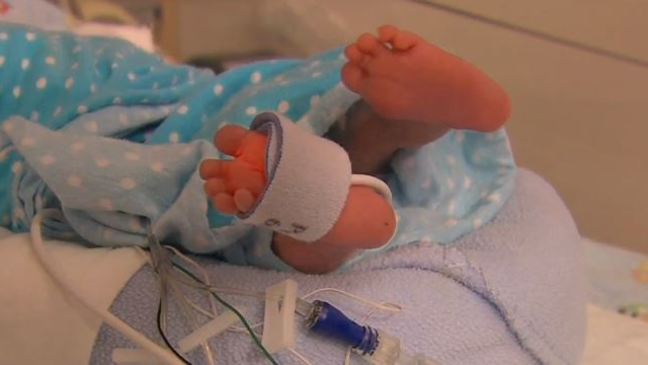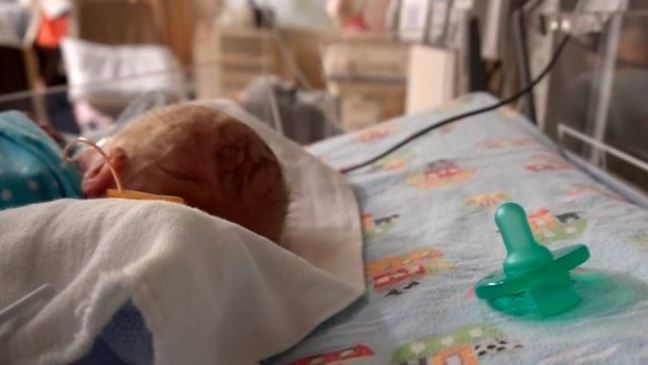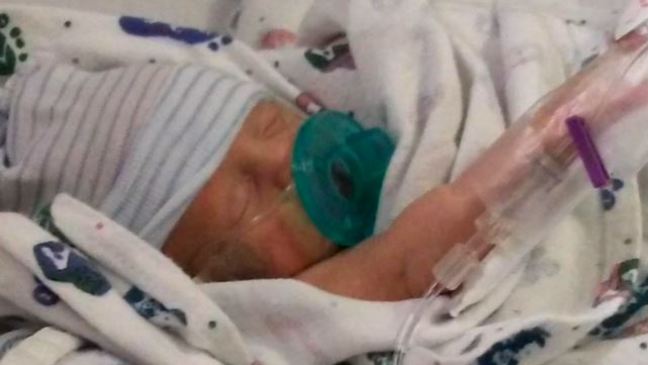Utah doctor is helping the smallest drug victims -- and it's saving lives
SALT LAKE CITY (KUTV) Utah’s opioid epidemic is spilling into newborn intensive care units where more and more babies are born with drugs coursing through their veins.
Opioids claimed the lives of 24 people every month in Utah in 2015. That’s getting close to a death every day -- and numbers are growing.
Meanwhile new research shows nearly one in every 15 babies born in Utah hospitals have a mom who's using drugs. The numbers are being gathered for the first time thanks to a Utah County doctor who saw a problem and decided to do something about it.
The doctor has found that as many as one in 20 moms are taking opioids while pregnant. That means their babies will be born with the high likelihood of a painful withdrawal in their first days of life.
“Seven days is what they say it takes to get addicted to opiates,” said Ryan Smith, who lives in East Carbon. He knows the reality of addiction all too well. His newborn son Jackson does as well.
Little Jackson was born two months early in February. He was rushed to Utah Valley Hospital where he was immediately admitted to the newborn intensive care unit, or NICU, on watch for drug withdrawal. His mom was addicted to opioids when she found out she was pregnant. Today she is getting help in a Provo addiction recovery home for addicted moms with newborns.
“It's been sad, it's been hard. He spent a month and a half in the hospital,” Smith said.
Smith's fiancé was prescribed opiates by her doctor for back pain due to scoliosis. She took the medication for several years before she found out she was pregnant. Smith said they knew she had a problem when her prescription would run out and withdrawal symptoms like shaking and vomiting would set in.
This family is one of many fighting to survive and overcome addiction.
“Whatever the mother is dependent on, the baby is forced into that same scenario,” said Stephen Minton, a neonatologist and head of Utah Valley's new born intensive care unit.
He said baby Jackson -- born at 4 pounds 11 ounces -- is one of a skyrocketing number of infants born with the chance of withdrawal and other issues down the road.
“We've had as many as six or seven babies at a time present in our unit,” Minton said. His entire career has been spent in this same NICU caring for babies born too soon.
“We assumed for a long time it was a small problem and when people began to look they began to find it was a bigger problem than we ever anticipated.”
Officials noted a growing number of preemies with symptoms of drug withdrawal,
Minton started by randomly sending in mother's umbilical cord’s for testing.
He said he found was a staggering number of cords returning from labs testing positive for marijuana, meth, cocaine, heroin, morphine and oxycodone.
"Big time drugs.”
Nearly one in 14 chords, or 6.8 percent, came back positive for drugs last year as Minton sent in a broader sample working with the Utah State Health Department and doctors at the University of Utah.
“Unfortunately what we are seeing now is a great diversity. It doesn't matter the socioeconomic status of people anymore,” he said.
Opiates made up the vast majority of positive tests with nearly one in 20 -- 4.7 percent -- of chords tested, returning positive for opiates.
And 2.1 percent contained barbiturates, benzodiazepines, alcohol, marijuana, methamphetamines and cocaine.
Smith said opioids have been a real problem in his relationship with his fiancé. He’s happy she’s getting the help for her addiction now, he just wishes it would have been sooner.
He advised others to seek other options.
"If it is not too bad, don't go over to using opiates. Use Tylenol," he said.
He talked about his family's struggles in hopes of helping even one person or one family avoid the pain he and his family are going through right now.
His fiancés' doctor followed a new protocol where a soon-to-be mom is prescribed methadone during her pregnancy as a way to ween mom and baby from the scarier forms they’re already on.
The decision to go from one opioid to another less potent was not an easy decision. Ryan says many “doctors don't recommend that they drop directly off the opiates themselves because they can cause miscarriage and birth defects.” The decision of what was best for their new baby weighed heavy on his mind.
His fiancé, stayed on methadone, hoping to do what was best for their baby.
Minton said the problem of addiction in the NICU has grown in part because family doctors don't have a set standard of care for women who come in both pregnant and addicted.
“We need to help the mother, the baby, the family” Minton said. “To make a difference in the future.”
He is now working with other doctors to make sure there is training for doctors on how best deal with women who come into their offices addicted to drugs.
“The best thing is to not have a pregnant woman on drugs. And if you do, if they get in a program so we can potentially reduce it or stabilize it out so these babies are much more stable at the time of delivery.” Moms and babies properly cared for during pregnancy have a “a much better course in our NICU,” said Minton.
Baby Jackson is a good example of how intervention can help. He was watched closely for his first two weeks, but ultimately did not withdraw from the methadone his mom was taking.
“Not 100 percent of kids have withdrawal, but it is a big high percentage,” Minton said. His team have also created a system for dosing painkillers to ween babies as fast as possible and with the least amount of pain if and when they do withdraw.
The efforts focus on keeping families together. Moms are encouraged to pump breast milk so they are involved in the care of their infant. Minton said he may not use much of the milk because of drug contamination, but will use some and dilute it with other milk.
Social worker Barbara Lovell works with Minton and families in the Utah Valley NICU.
“The most important thing is that you are successful. This is a great time in your life to make that change. You have the motivation and the best reason in the world. You have a new little baby that needs you and wants you,” Lovell said.
Smith and his fiancé spent two months with their son in the NICU. Once home, they realized they could not continue to fight the addiction on their own. They found a drug treatment program in Utah County that keeps moms and babies together. They are in their second month of treatment at Provo’s House of Hope.
For Smith, left at home, he’s disappointed not having his son with him, but knows it is a chance worth taking to save their family.
__________
In Utah, deaths from prescription medications increased nearly 400 percent from 2000 to 2014.
The state Health Department started tracking moms addicted to opioids during pregnancy this year.
In 2015, 24 individuals (residents and non-residents) died every month from a prescription opioid overdose in Utah



